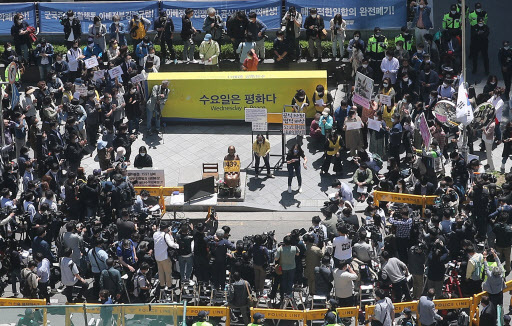[From the scene] Activists strive to save legacy of ‘comfort women’ rally
By Ock Hyun-juPublished : May 13, 2020 - 17:30

The weekly rally protesting Japan’s wartime sexual enslavement of Korean women was held in Seoul on Wednesday, as it has been on the past 1,438 Wednesdays.
The latest one, however, came amid renewed scrutiny from the public and media over the organizing group’s operations and handling of donations.
“The Korean Council (for Justice and Remembrance for the Issues of Military Sexual Slavery by Japan) has never misappropriated or illegally run funds, and we have received an accounting audit from lawyers and accountants every year,” said Lee Na-young, who leads the civic group, at the rally in front of the Japanese Embassy in Seoul.
Lee and other participants – all activists and organizers – vowed to protect the legacy of their 30-year campaign for former sex slaves against “malicious” attacks and continue their fight until the Japanese government apologizes to the victims.
Some 2,500 people participated in the rally live through livestreaming services. Due to safety concerns raised by the COVID-19 outbreak, only the organizers were present at the scene and supporters took part online.
The 1439th rally came after one of the surviving victims alleged that the organizing group did not use donations transparently.
Last week, Lee Yong-soo, a 92-year-old victim of Japanese military sexual slavery during Japan’s 1910-45 colonization of the Korean Peninsula, said she would not attend the Wednesday rallies anymore. She said the group did not spend the donations on the victims and used the victims for their cause.
After the open rift, conservative media and politicians piled criticism on the group, accusing it of misappropriation. The main opposition party called the group’s former leader Yoon Mi-hyang, who was elected to the National Assembly as a proportionate representative in April, to resign from the parliament.
Some conservative groups held separate rallies only meters away, denouncing the civic group and its former leader Yoon. No physical clashes were reported.
Lee, Yoon’s successor, claimed the allegations were attempts to distort history and hamper efforts to resolve the issue of “comfort women” -- a euphemism for victims forced into sexual slavery at Japanese military brothels.
While admitting to some errors in its accounting records on the country’s tax service system, she added the group would fix the mistakes and have the accounting records verified again by other accountants.
Out of about 2.2 billion won in donations the group raised for general purposes from 2017-2019, 910 million won, about 41 percent of the total, was spent on supporting the victims, according to the group.
The civic group said that its activities are not limited to financially supporting the victims, adding its movement also centers on restoring honor and dignity of the victims and raising awareness of the issue on global forums, it added.
“Supporting the victims is the Korean government’s job, as well as the Japanese government’s job to do after it apologizes to the victims,” Kim Young-soon, one of the co-heads of the Korean Women’s Associations United, said at the rally.
“The Korean Council has supported the victims, who had been excluded from the government support, as a civic group advocating for women, peace and human rights, and it must not be a subject of any attacks,” she said.
The rally, the world’s longest-running demonstration, has been held every Wednesday since 1992 near the Japanese Embassy in Seoul to demand an apology and reparations from the Japanese government.
The victim Lee has been at the forefront of demanding an apology from Japan for the wartime atrocities alongside the civic group, for the past three decades.
More recently, she has protested the 2015 deal signed under the Park Geun-hye administration to resolve the issue that has strained Seoul-Tokyo relations. Under the deal, Japan apologized to the victims and provided 1 billion yen ($9.4 million) for a South Korea-run foundation to help the victims.
Some victims, including Lee, took issue with the government’s failure to consult with the victims in advance and address their demands.
(laeticia.ock@heraldcorp.com)
-
Articles by Ock Hyun-ju











![[Today’s K-pop] BTS pop-up event to come to Seoul](http://res.heraldm.com/phpwas/restmb_idxmake.php?idx=644&simg=/content/image/2024/04/17/20240417050734_0.jpg&u=)





![[KH Explains] Hyundai's full hybrid edge to pay off amid slow transition to pure EVs](http://res.heraldm.com/phpwas/restmb_idxmake.php?idx=652&simg=/content/image/2024/04/18/20240418050645_0.jpg&u=20240419100350)

![[Today’s K-pop] Zico drops snippet of collaboration with Jennie](http://res.heraldm.com/phpwas/restmb_idxmake.php?idx=642&simg=/content/image/2024/04/18/20240418050702_0.jpg&u=)